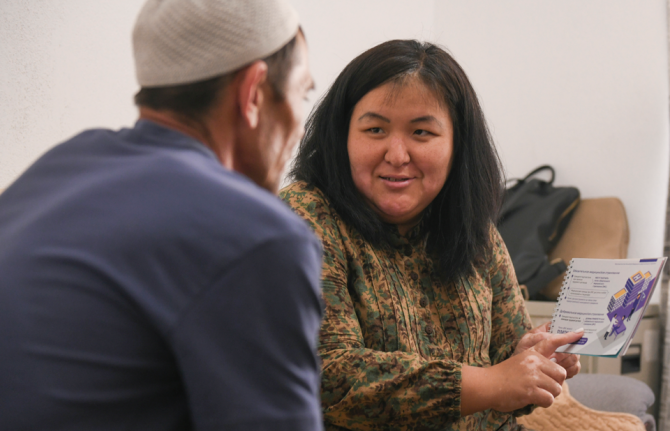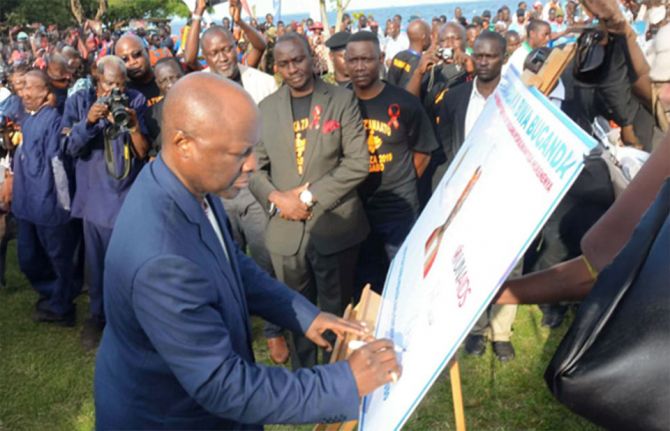

Feature Story
Former heads of state and Nobel laureates call on President Biden to waive intellectual property rules for COVID vaccines
14 April 2021
14 April 2021 14 April 2021More than 170 former heads of state and government and Nobel laureates, including former Prime Minister of the United Kingdom Gordon Brown, former President of Colombia Juan Manuel Santos, former President of Liberia Ellen Johnson Sirleaf, former President of France François Hollande and Nobel Laureates Professor Joseph Stiglitz and Professor Francoise Barre-Sinoussi, today called on President Biden to support a waiver of intellectual property rules for COVID-19 vaccines and pursue a people’s vaccine to end the pandemic in an open letter today.
The letter was sent to the White House as U.S. health authorities advised a pause in the use of the Johnson & Johnson Covid-19 vaccine. A waiver of intellectual property rules would allow for a scale up in manufacturing in the U.S. and around the world, overcoming artificial supply constraints.
The former world leaders and Nobel Laureates encourage President Biden to take the urgent action only he can and “let this moment be remembered in history as the time we chose to put the collective right to safety for all ahead of the commercial monopolies of the few.”
The letter specifically asks President Biden to support a proposal from the South African and Indian governments at the World Trade Organization (WTO) to temporarily waive intellectual property rules related to COVID-19 vaccines and treatments. At the current pace of vaccine production, most poor nations will be left waiting until at least 2024 to achieve mass COVID-19 immunization.
Gordon Brown, former Prime Minister of the United Kingdom said:
"President Biden has said that no one is safe until everyone is safe, and now with the G7 ahead there is an unparalleled opportunity to provide the leadership that only the U.S. can provide and that hastens an end to the pandemic for the world.”
“An urgent temporary waiver of intellectual property rules at the World Trade Organization would help us ramp up global supply of vaccines together with a global multi-year burden sharing plan to finance vaccines for the poorest countries”.
“This would be in the strategic interests of the U.S., and of every country on the planet".
Joseph Stiglitz, Nobel Economics Prize Laureate, said:
“While the U.S. has made enormous progress in vaccinating its own population, thanks to the efforts of the Biden administration, that alone is unfortunately not enough”.
“New mutations of the virus will continue to cost lives and upend our interconnected global economy until everyone, everywhere has access to a safe and effective vaccine. Intellectual property is the utmost artificial barrier to global vaccine supply. We as a nation must lead with our allies to back the South Africa and India waiver at the WTO, insist on technology transfer, and strategically invest in production”.
François Hollande, former President of France, said:
“The extreme inequality in access to vaccines around the world creates an unbearable political and moral situation. It is above all sanitary and economic nonsense as we are all concerned. That the Biden administration is considering waiving barriers related to intellectual property rules offers hope for the international community. If the United States supports the lifting of patents, Europe will have to take its responsibilities. In the face of this devastating pandemic, world leaders must prioritize the public interest and international solidarity”.
Other signatories include Mary Robinson, the former President of Ireland, Fernando Henrique Cardoso, the former President of Brazil, and Helen Clark, the former Prime Minister of New Zealand, together with over 60 other former heads of state and heads of government that span every continent.
The leaders also called for the intellectual property waiver to be accompanied by the open sharing of vaccine know-how and technology, and by coordinated and strategic global investment in research, development, and manufacturing capacity, especially in developing countries, underscoring that threats to public health are global and require global solidarity-based solutions.
These actions would expand global manufacturing capacity, unhindered by industry monopolies that are driving the dire supply shortages blocking vaccine access. The resulting vaccine inequality, the leaders warned, means that the U.S. economy already risks losing $1.3 trillion in GDP this year, and if the virus is left to roam the world, the increased risk of new viral variants means even vaccinated people in the U.S. could be unprotected once more.
The letter, which was coordinated by the People’s Vaccine Alliance, a coalition of more than 50 organizations including Club de Madrid, Health GAP and UNAIDS, warned that at the current global immunization rate, it was likely that only 10 percent of people in the majority of poor countries will be vaccinated in the next year.
Françoise Barré-Sinoussi, Nobel Prize in Physiology or Medicine Laureate said:
“We will not end today’s global pandemic until rich countries – most especially the United States – stop blocking the ability of countries around the world to mass produce safe and effective vaccines”.
“Global health is on the line. History is watching. I, with my fellow laureates and scientists across the globe, urge President Biden to do the right thing and to support the TRIPS waiver, insist on pharmaceutical corporations to share vaccine technologies with the world, and strategically invest in distributed production”.
Muhammad Yunus, Nobel Peace Prize Laureate said:
“Big pharmaceutical companies are setting the terms of the end of today's pandemic – and the cost of allowing senseless monopolies is only more death and more people being pushed into poverty”.
“We need strong government action to lead - not only philanthropy and the private sector – to solve today’s unprecedented crisis. We together urge President Biden to stand on the right side of history – and ensure a vaccine is a global common good, free of intellectual property protections".
--
Notes to editors:
The full letter and list of signatories can be found at here
The letter was coordinated by the People’s Vaccine Alliance, a coalition of more than 50 organizations including Club de Madrid, the Yunus Centre, Oxfam, Health GAP, UNAIDS, Physicians for Human Rights, the Nizami Ganjavi International Center, Global Justice Now and Avaaz.
Focus area
Related

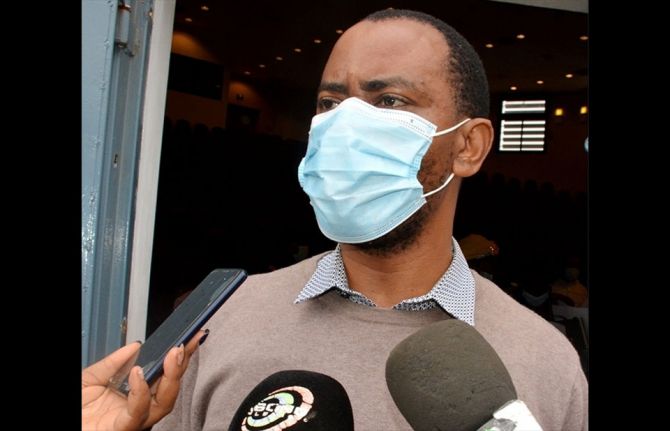
Feature Story
UNAIDS supports community-based campaign against COVID-19 in Equatorial Guinea
29 March 2021
29 March 2021 29 March 2021The Government of Equatorial Guinea has launched a new community-based campaign against COVID-19 with the support of UNAIDS.
The UNAIDS Country Office for Equatorial Guinea has been supporting the government of the country since the beginning of the COVID-19 pandemic. It has supported testing and sensitization campaigns for people living with HIV and has now joined the new community-based campaign by providing the Ministry of Health with financial support to support volunteers and facilitate their travel.
The first 10 days of the campaign will focus on Bioko Island and the campaign will continue on the mainland from the end of March. Since February, there has been an upsurge of new COVID-19 infections in Malabo, the capital of Equatorial Guinea. The new campaign will allow the health authorities to trace people with COVID-19 and quickly isolate high-risk patients in order to limit the risk of transmission.
The Director-General for Hospital Coordination, Juan José Owono Okiri Nkogo, said, “After only two days of the campaign, we have already detected nearly 50 positive cases, which have been quickly managed and directed to the reference centres.”
Justino Obama, the President of the National Committee for the Fight against COVID-19, praised UNAIDS’ efforts. “Equatorial Guinea thanks the UNAIDS office for this support,” he said.
“As with HIV, our most effective weapons against COVID-19 are solidarity and responsibility. Thanks to them, we will win the battle against COVID-19,” said Jeanne Seck Ndeng, the UNAIDS Country Director for Equatorial Guinea.
Our work
Region/country
Related
 Impact of the pause of US foreign assistance in Côte d'Ivoire
Impact of the pause of US foreign assistance in Côte d'Ivoire

19 February 2025

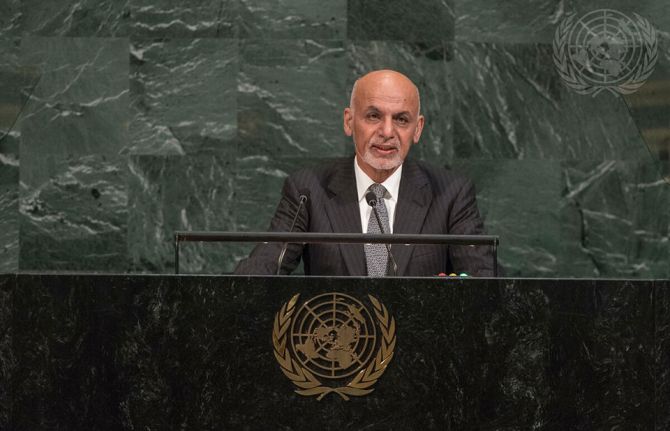
Feature Story
President of Afghanistan declares ‘unwavering support’ for a People’s Vaccine for COVID-19
01 April 2021
01 April 2021 01 April 2021The President of Afghanistan, Mohammad Ashraf Ghani has joined world leaders and experts in an appeal for equitable and fair distribution of COVID-19 vaccines.
In a letter to the People’s Vaccine Alliance, President Ghani outlined that despite the numerous challenges Afghanistan continues to face as a country caught in conflict, Afghanistan has witnessed fewer human losses caused by the COVID-19 pandemic compared to other countries. However, the President underscored that this did not mean that the resulting implications were underestimated or ignored.
“We must put in place all possible efforts to maximize the supply of vaccine so that everyone, everywhere can benefit as quickly as possible,” said President Ghani. “I assure you of my unwavering support to the People’s Vaccine Alliance.”
In the letter he urges fellow leaders to urgently develop a common plan to massively scale up manufacturing of the vaccine. Which would not only save millions of lives, but also build capacity and infrastructure in countries around the world to manufacture medicines and vaccines to help achieve universal health coverage and prepare for future health emergencies.
He also urged fellow leaders—especially leaders in high-income countries—to insist that the vaccine technology and know-how is shared through the World Health Organization's Covid-Technology Access Pool, and that leaders unite to strongly support the proposal made by India and South Africa to the World Trade Organization to waive patents during the pandemic.
The President of Afghanistan joins more than 150 leaders and advocates globally who have signed up to be part of the People’s Vaccine Alliance including the President of South Africa and the Chairperson of the African Union Commission, the Presidents of Ghana and Senegal, the Prime Minister of Pakistan, the Director of the Africa Centres for Disease Control and Prevention and the Special Rapporteur on the right of everyone to the enjoyment of the highest attainable standard of physical and mental health.
“EMERGENCY and all the members of People Vaccine Alliance advocate for equal access to the vaccines: while millions of people who have already been vaccinated in the United States, the United Kingdom or European countries feel safer, most of the low-income countries will barely be able to vaccinate one out of 10 people in 2021 due to the inaccessibility of vaccines,” said Rossella Miccio, President of EMERGENCY.
The People’s Vaccine Alliance calls on pharmaceutical corporations and governments to:
- Prevent monopoly on vaccine production by making public funding for research and development conditional on research institutions and pharmaceutical companies sharing all information, data, biological material, know-how and intellectual property. The WHO COVID-19 Technology Access Pool provides the mechanism for such sharing.
- Prevent monopoly on vaccine supply by enabling as many manufacturers as possible, including in developing countries, to produce the vaccines.
- Implement fair allocation of the vaccine that prioritizes health workers and other at-risk groups in all countries. Vaccination programmes should include marginalized groups, including refugees, prisoners and people living in slums and other crowded housing conditions. Allocation between and within countries should be based on need and not ability to pay.
- Provide the vaccine free of charge at the point of use.
- Ensure the full participation of the governments of developing countries as well as global civil society in decision-making forums about the vaccines (and other COVID-19 technologies) and ensure transparency and accountability of all decisions.
The People’s Vaccine Alliance
The People’s Vaccine Alliance is a coalition of organisations and activists united under a common aim of campaigning for a People’s Vaccine’ for COVID-19 that is based on shared knowledge and is freely available for all. A global common good. It is coordinated by Oxfam and UNAIDS and its other members include: EMERGENCY, Free the Vaccine, Frontline AIDS, Global Justice Now, International Treatment Preparedness Coalition, Just Treatment, Nizami Ganjavi International Center, Open Society Foundations, STOPAIDS, SumOfUs, Wemos and Yunus Centre.
Our work
Region/country

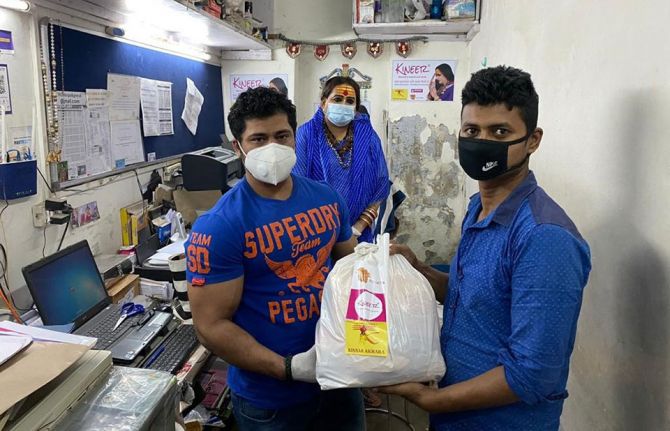
Feature Story
Solidarity fund helping transgender people during the COVID-19 pandemic
30 March 2021
30 March 2021 30 March 2021As the COVID-19 pandemic continues, the ongoing global health crises and resulting economic consequences of the measures imposed to contain COVID-19 have highlighted the vast and rapidly growing inequities threatening the livelihoods of the most vulnerable.
This has been especially true for transgender people around the world, who have disproportionally borne the socioeconomic hardships of the pandemic. Speaking about the transgender community in India, transgender activist Laxmi Narayan Tripathi said, “People didn’t have money to pay rent. Not even to buy rice. People may die of COVID-19, but they may die of hunger even sooner.” The Kineer Services, an initiative created by Mrs Tripathi focusing on creating employment for the transgender community in India, organized and created a platform to provide food to the transgender community across several states in India in order to tide people over the immediate hardship. Sustainable support, however, is a challenge. “What else would be better than us empowering our own people, those that are living on the margins of society, to become entrepreneurs?” Ms Tripathi added.
Recognizing that access to finance is a critical factor towards supporting vulnerable populations to survive the immediate crisis and the impact of lockdowns, UNAIDS and partners launched the Solidarity Fund for Key Populations Social Entrepreneurships and will support eight proposals for transgender-led social enterprises in its pilot phase. The pilot is being rolled out in Brazil, Ghana, India, Madagascar and Uganda. It will finance a series of selected social enterprise grants led by key populations, which will be announced in early April.
“The solidarity fund is a small step towards addressing the economic inequities faced by transgender communities. It is about building and supporting entrepreneurs from within the transgender community to address the extreme discrimination and vulnerability that the transgender community faces,” said Pradeep Kakkattil, Director, Office of Innovations, UNAIDS
The variety of social enterprises received through the solidarity fund’s first proposal call from transgender communities is a testament to the ingenuity of community-led organizations in the face of special hardship. In Uganda, Tranz Network Uganda has established the Transgender Resilience and Economic Empowerment (TREE) pilot programme in order to contribute to the economic transformation of transgender people in Uganda. The TREE project will build social capital and the resilience of transgender people in Uganda through the formation of saving groups, the promotion of financial inclusion, entrepreneurship, vocational skills development and linkages to other social economic empowerment activities.
The selected applicants for the pilot phase of the solidarity fund have shown how civil society organizations and networks are playing a critical role in providing essential social safety nets for vulnerable communities and transgender populations during the pandemic.
In Ghana, the Hope Alliance Foundation (HAF) and the OHF Initiative have been working together for the past nine years on implementing numerous HIV-related programmes that include emergency support, home-based care, capacity-building and peer support. As the ongoing pandemic and the subsequent lockdowns continue to heavily impact the Ghanaian labour market, particularly vulnerable workers, HAF and the OHF Initiative are aiming to address the resulting economic challenges through capacity-building programmes and the implementation of income-generating activities. Through the Community Economic Empowerment Program, the two organizations will work with lesbian, gay, bisexual, transgender and intersex people and people living with HIV to provide them with vocational skills training and to revitalize small- and medium-sized business that have been adversely impacted by the economic downturn due to COVID-19-related lockdowns.
In Bihar, India, Reshma Prasad sees a unique opportunity for the transgender community, which has developed unique skills in dancing, singing, art and entertainment within the local culture and across the country. Through Nachbaja, Ms Prasad wants to bridge the current gap between transgender communities and digital media by providing a centralized online platform on which they can market their skills, allow people to directly connect with the artists themselves and provide the artists with an opportunity to receive fair pricing and wider exposure for their services. Nachbaja.com has already registered more than 1000 artists for its platform and aims to grow the platform to reach all of India.
In Brazil, Grupo De Trabalhos em Prevenção Posithvo (GTP+) has been supporting people living with HIV by providing them with food security since 2016 through their Cozinha Solidaria (Solidarity Kitchen). Noticing a vast and sudden drop of the income of their beneficiaries in the past year due to the ongoing pandemic and related lockdowns in Brazil, GTP+ saw a unique opportunity to combine their knowledge of confectionary and gastronomy with entrepreneurial ventures for their beneficiaries. Through Confeitaria Escola–Cozinha Solidária (Confectionary School–Solidarity School), the organization will aim to commercialize and grow its operations by creating confectionary and food baskets for commemorative occasions while proving relevant entrepreneurial training guidance for all members.
“UNICEF recognizes the critical importance of HIV prevention among young key populations if we are to end the AIDS epidemic. We believe that this can be best accomplished by empowering communities directly. The solidarity fund is a unique resource that will do just that. For young people, these investments will yield lifelong opportunities,” said Chewe Luo, Associate Director and HIV Programme Chief, United Nations Children’s Fund.
As transgender communities become increasingly marginalized, especially during the ongoing global pandemic and subsequent lockdown measures, UNAIDS is committed to eradicating all forms of discrimination faced by transgender communities and stands behind them to drive workplace equality forward.
Our work
Related
 Government ensures continuity of treatment in Malawi
Government ensures continuity of treatment in Malawi

10 February 2025

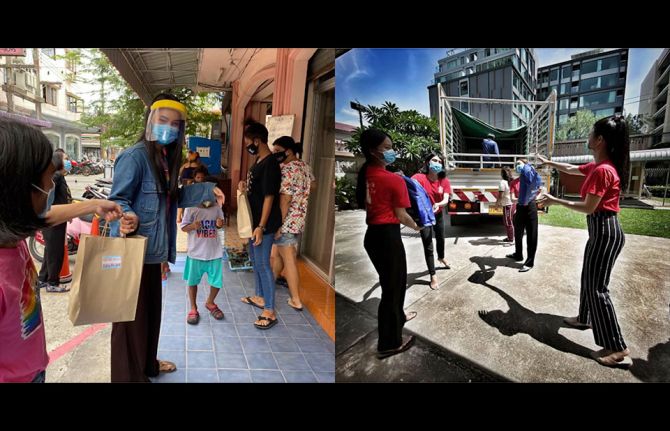
Feature Story
Transgender communities in Asia and the Pacific respond to COVID-19 through activism
30 March 2021
30 March 2021 30 March 2021The global health emergency caused by the COVID-19 pandemic has brought existing inequalities to the forefront, has exposed transgender and gender-diverse communities to a heightened risk of social exclusion, stigma and discrimination, has reduced access to health care and has caused financial insecurity.
“COVID-19 has created an existential threat to many transgender people in Asia and the Pacific. But trans-led organizations and groups have found creative ways to assist their communities, to offer support against social isolation and to support trans and gender-diverse people, especially those unable to work due to COVID-19. We recognize the importance of trans leadership and their response to communities greatly affected by the pandemic,” said Joe Wong, Executive Director of the Asia Pacific Transgender Network (APTN).
When COVID-19 reached India, Maya, a young transgender woman living with HIV volunteering at Basera Samajik Sansthan, a transgender-led community-based organization in Uttar Pradesh, was living in rented accommodation after being rejected by her family. “During the COVID-19 outbreak, my friends and I had to leave our homes because we couldn’t afford the rent,” she said. Basera Samjik Sansthan provided her and her friends with shared accommodation and supplied them with food and medicine. The community-led organization also established a peer support programme to help homeless transgender young people and provide them with hand sanitizer, masks and access to free HIV and COVID-19 testing.
Her testimony is part of a collection of stories published in Dignity amidst COVID-19: Trans Youth Leading The Response, developed by APTN and Youth LEAD, and supported by the UNAIDS Regional Support Team for Asia and the Pacific, to bring visibility to the voices and experiences of transgender and gender-diverse youth leaders and showcase the efforts of transgender-led organizations throughout the region during COVID-19.
“Many transgender people living with HIV were not able to afford transportation to medical centres to receive treatment during the COVID-19 outbreak,” said Della, a young transgender woman living with HIV from Indonesia who works for the Srikandi Sejati Foundation, whose testimony is also collected in the Dignity amidst COVID-19 series. The Srikandi Sejati Foundation established a community support programme that covered transport costs to medical centres to ensure that transgender people could access HIV services. It also implemented local workshops to support and empower transgender women in five districts in Jakarta with knowledge on COVID-19, HIV, mental health and adherence to antiretroviral therapy.
In Thailand, measures taken to curb the spread of COVID-19 and the consequent decline in tourism have forced many entertainment shows and venues to close, leaving many transgender people out of work. “The decline in tourism has heavily affected not only businesses but sources of income for transgender people. Many trans women have returned to rural areas to be with their families due to loss of employment,” said Garfield, a young transgender woman working for the Sisters Foundation, a transgender-led organization in Pattaya that provides a range of HIV services to transgender people, including check-ups for general health, HIV and sexually transmitted infections, hormone therapy and harm reduction. As described in the collection of stories, since the beginning of the pandemic, Garfield and other volunteers have been at the forefront of the COVID-19 relief efforts, distributing food supplies and hygiene products to transgender women.
Basera Samajik Sansthan, the Srikandi Sejati Foundation and the Sisters Foundation are all beneficiaries of the COVID-19 Community Support Fund established by APTN to support transgender people and community-based organizations to ease the burden of the COVID-19 pandemic in the region. APTN provided grants to 22 transgender-led and transgender-inclusive community groups and organizations across 14 countries, enabling them to assist more than 2300 people across Asia and the Pacific. The grant supported various initiatives, including access to essential supplies, food and personal protective equipment, social and mental health relief support, financial assistance and funding support to sustain organizations.
The community-led initiatives and outcomes of the response to COVID-19 are summarized in the Trans Resilience Report—Stories of Hope, Pain, and Survival from the Trans Movement during the COVID-19 Pandemic, developed with financial support from the UNAIDS Regional Support Team for Asia and the Pacific, and in APTN’s multi-week social media campaign.
“On International Transgender Day of Visibility, UNAIDS recognizes the indispensable contributions made by transgender communities in the HIV and COVID-19 response. The leadership and resilience of transgender and gender-diverse communities continues to be an inspiration for our region,” said Eamonn Murphy, Director of the UNAIDS Regional Support Team for Asia and the Pacific. UNAIDS will continue to work with APTN and transgender-led organizations to work towards a region where transgender people and gender-diverse people can thrive as equals.
Our work
Region/country
- Asia and Pacific
- Australia
- Bangladesh
- Bhutan
- Brunei Darussalam
- Cambodia
- China
- Democratic People's Republic of Korea
- Federated States of Micronesia
- Fiji
- India
- Indonesia
- Islamic Republic of Iran
- Japan
- Kiribati
- Lao People's Democratic Republic
- Malaysia
- Maldives
- Marshall Islands
- Mongolia
- Myanmar
- Nauru
- Nepal
- New Zealand
- Pakistan
- Palau
- Papua New Guinea
- Philippines
- Republic of Korea
- Singapore
- Solomon Islands
- Sri Lanka
- Thailand
- Timor-Leste
- Tonga
- Tuvalu
- Vanuatu
- Viet Nam
- Samoa

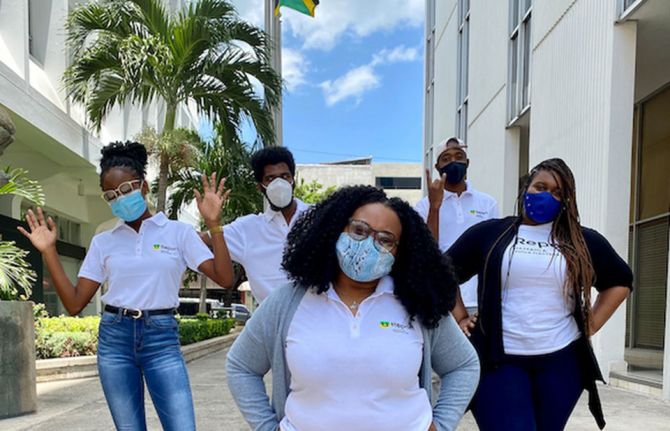
Feature Story
Digital HIV education for Jamaican young people during COVID-19 and beyond
22 March 2021
22 March 2021 22 March 2021Since school doors closed last March due to COVID-19, the majority of Jamaican students are still receiving tuition exclusively online. Social media and messaging services are more relevant than ever as a channel to share knowledge and resources with young people, as well as to receive their feedback.
The United Nations Children’s Fund (UNICEF) U-Report is an innovative message-based tool designed to engage with young people, provide them with information and give them an opportunity to weigh in on issues of national importance. Jamaica became the first Caribbean country to launch U-Report, joining a global movement of more than 5 million U-Reporters. UNAIDS Jamaica recently collaborated with UNICEF to find out what young people know, or don’t, about HIV. The 10-question quiz also provided correct information to the participants.
Almost 2000 young people responded to the survey, with just 214 achieving a perfect score. The quiz pointed to some worrying gaps in knowledge relating to both HIV basics and access to information on HIV prevention. One in 10 respondents mistakenly thought HIV could be transmitted by mosquitoes, for example. Almost one in three were not aware of the local solution for delivering school-based sex education, the Health and Family Life curriculum.
The results of the survey corroborate Jamaica’s most recent Knowledge, Attitude and Behaviour (KAB) survey results and demonstrate that there are still glaring HIV knowledge gaps among young people. The survey revealed that only 33% of young people between the ages of 15 and 24 years correctly identified the ways in which HIV can be transmitted. This was a 6% decline in knowledge levels as compared to the 2012 KAB survey. The 2017 study also found that 40% of respondents with multiple partners did not use a condom during their last sexual encounter.
“The results of the HIV U-Report quiz have reinforced the need for efforts to be made to address the decline in knowledge on information on HIV among young people in Jamaica,” said the UNAIDS Country Director for Jamaica, Manoela Manova. “Particularly in the context of COVID-19, it is critical that we innovate to ensure that this messaging and engagement takes place on digital platforms and with a view to ensuring that no child or young person is left behind.”
The U-Report social messaging tool has proved to be a quick and useful way to gather information that can be used to inform programmes and plans focusing on young people in Jamaica. UNICEF Jamaica has supported innovations to ensure that children and young people have access to education and support during COVID-19, including tele-mental health services, virtual instruction training for teachers and strategies to close the digital divide.
During COVID-19, virtual dialogues and behaviour change communication have been scaled up. A UNICEF-supported initiative aims to address the gaps in HIV and sexual and reproductive health knowledge for young people in Jamaica. The National Family Planning Board’s Adolescent Sexual and Reproductive Health Campaign focuses on teen health, including targeting sexually active teenagers with messages on condom use and dispelling myths about HIV transmission. The campaign disseminates sexual and reproductive health/HIV information through social media and uses animated characters to reach adolescents. The campaign also speaks about the benefits of abstinence and birth control.
Our work
Region/country
Related

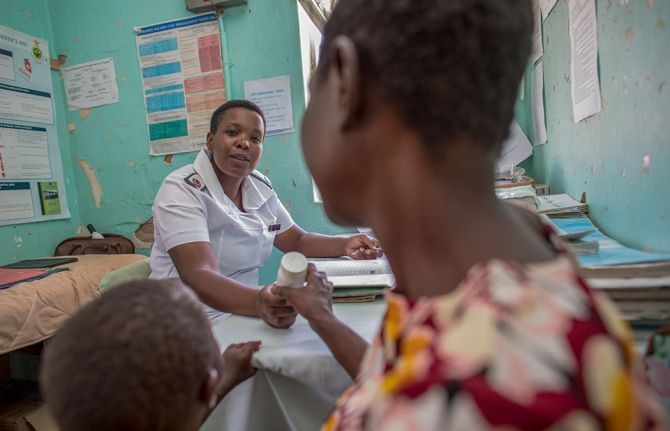
Press Statement
UNAIDS welcomes bold support from the United States of America in response to colliding pandemics
18 March 2021 18 March 2021GENEVA, 18 March 2021—UNAIDS warmly welcomes the passing of the US$ 1.9 trillion American Rescue Plan Act. The historic legislation will deliver much-needed relief in the light of COVID-19, both in the United States of America and around the world.
The bill’s inclusion of nearly US$ 11 billion for global investments in COVID-19 will help to save many lives. The allocation of US$ 250 million for the United States President’s Emergency Plan for AIDS Relief (PEPFAR) and US$ 3.5 billion for the Global Fund to Fight AIDS, Tuberculosis and Malaria (Global Fund) will help to prevent hard-won progress against HIV, tuberculosis and malaria from being reversed.
“The support of the United States for the global response to COVID-19 is highly commendable, particularly as it grapples with the devastating impact of COVID-19 at home,” said Winnie Byanyima, Executive Director of UNAIDS. “With the American Rescue Plan Act the United States proves again its steadfast commitment to the AIDS response and to fighting other global pandemics. We look forward to continuing our strong partnership with the United States in our shared commitment to end AIDS and to overcome COVID-19,” said Ms Byanyima.
Generous bipartisan support from the United States has allowed great strides to be made against the AIDS pandemic. Investments made by the United States over the past 18 years through PEPFAR and the Global Fund have proved transformational—they have prevented millions of HIV infections and saved the lives of millions of people. People living with HIV who are on antiretroviral therapy can now enjoy long, healthy lives and the number of new HIV infections and AIDS-related deaths are on the decline, although the rate of decline is still far too slow.
“Despite the tremendous successes, the work is unfinished. AIDS remains an urgent global health crisis,” said Ms Byanyima.
Global averages conceal the reality that too many people are still being left behind. The world did not reach the 2020 Fast-Track prevention and treatment targets committed to in the UNAIDS 2016–2021 Strategy and the United Nations Political Declaration on Ending AIDS. Many countries and communities are not currently on track to end AIDS by 2030.
While 26 million of the 38 million people living with HIV are accessing life-saving treatment, which doubles as prevention by stopping the spread of the virus, another 12 million remain without. The rate of new HIV infections, especially for adolescent girls and young women in sub-Saharan Africa and members of key populations, remains high. In 2019, a further 1.7 million people worldwide were newly infected with HIV and 690 000 people died of AIDS-related illnesses. The rate of new HIV infections and deaths, especially among the hardest to reach populations, means that continued success requires greater effort, focus and commitments. This is doubly true as COVID-19’s impact puts added pressure on the HIV response.
“The global response to AIDS was off track prior to COVID-19. Unchecked, COVID-19 threatens to reverse valuable progress made against HIV. This confluence of pandemics requires an acceleration of efforts to close the gaps in HIV testing, prevention and treatment while working to stop COVID-19’s spread,” said Ms Byanyima. “Identifying where, why and for whom the HIV response could be improved has illuminated the inequalities, within and between countries, that contribute to the spread of HIV. The stark contrast of success in some places and among some groups of people and the failure in others confirms that HIV remains a pandemic of inequalities. That is why the new global AIDS strategy 2021–2026 contains new targets to help us reach those who are being left behind.”
Fortunately, investments in accelerating the HIV response do not come at the expense of the COVID-19 response, but rather support many of its most critical requirements. Nations combatting COVID-19 are already applying lessons learned from the HIV response, using the systems, human resources, know-how and laboratories built over the past two decades.
Efforts to reinforce and leverage the infrastructure built to end AIDS can optimize the health impact and sustainability of the response to COVID-19. Leveraging the experience of the HIV response offers a unique opportunity to build back better from COVID-19.
“These new investments from the United States in COVID-19 will save many lives in low- and middle-income countries and help strengthen the health systems that deliver care for HIV, COVID-19 and other health emergencies,” added Ms Byanyima.
UNAIDS
The Joint United Nations Programme on HIV/AIDS (UNAIDS) leads and inspires the world to achieve its shared vision of zero new HIV infections, zero discrimination and zero AIDS-related deaths. UNAIDS unites the efforts of 11 UN organizations—UNHCR, UNICEF, WFP, UNDP, UNFPA, UNODC, UN Women, ILO, UNESCO, WHO and the World Bank—and works closely with global and national partners towards ending the AIDS epidemic by 2030 as part of the Sustainable Development Goals. Learn more at unaids.org and connect with us on Facebook, Twitter, Instagram and YouTube.
Contact
UNAIDS GenevaSophie Barton-Knott
tel. +41 79 514 68 96
bartonknotts@unaids.org
UNAIDS Media
tel. +41 22 791 4237
communications@unaids.org
Press centre
Download the printable version (PDF)

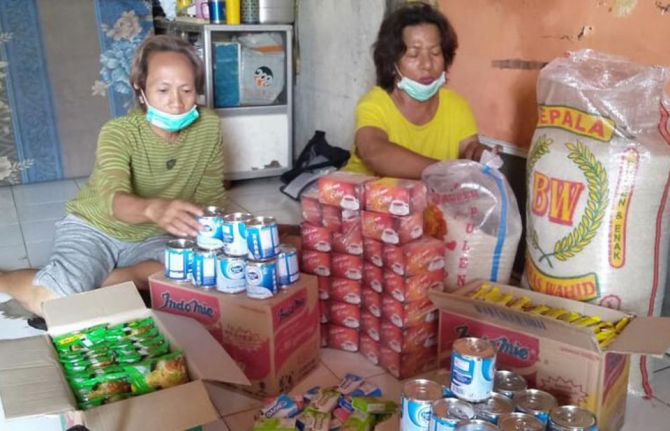
Feature Story
UNAIDS works with partners to support the COVID-19 recovery for vulnerable people in Indonesia
26 March 2021
26 March 2021 26 March 2021Many people have been able to work from home during the COVID-19 pandemic and continue to be paid, but low-income workers often haven’t had that opportunity.
In Indonesia, the latest labour force survey results show that 29 million workers have been affected by the pandemic, with 24 million workers suffering from cuts in hours of work and income. Average wages were depressed by 5.2% between 2019 and 2020. Surveys conducted by the Indonesia AIDS Coalition show that the situation is similar for people living with HIV and key populations—more than 80% of 529 respondents had experienced a reduction or loss of income due to the pandemic.
To address the rising income inequality, the United Nations allocated a US$ 1.7 million funding package to bolster the economic empowerment of women and vulnerable populations in Indonesia and to help protect their livelihoods from the devastating socioeconomic fallout of the COVID-19 pandemic. In 2020, the UNAIDS Country Office for Indonesia worked with the International Labour Organization, the United Nations Development Programme and the Office of the United Nations High Commissioner for Refugees to mobilize the funding.
A joint project launched earlier this month will directly benefit and empower vulnerable groups, including women, people living with HIV, key populations, refugees, migrant workers and people in disadvantaged regions.
The one-year project offers support through training on entrepreneurship and business development and facilitates access to skills development and jobs. UNAIDS will work closely with civil society organizations to identify the beneficiaries and ensure that people living with HIV and transgender people and other key populations are among the approximately 3650 people to be supported by the project.
The Indonesia Positive Network is among the organizations that will be involved in the project. Meirinda Sebayang, the National Coordinator of the Indonesia Positive Network, appreciates the support of the project. “COVID-19 has amplified existing disparities, especially for the livelihoods of people living with HIV and key populations in Indonesia. In this difficult time, we learned that it is important to build trust and strong collaboration between communities, government, health services and United Nations partners, not only to ensure that essential services remain available but to ensure that our community is not left behind in the response and recovery from the socioeconomic impact of COVID-19,” she said.
The project also includes advocacy for policies that promote inclusion and respond to discrimination in the government, the private sector and trade unions. Through this sensitization and advocacy work, these sectors will be required to protect vulnerable groups from discrimination and exclusion from the job market, even beyond the COVID-19 recovery.
One year into the pandemic, it is crucial that United Nations agencies join forces to support vulnerable groups, which have been disproportionately impacted by COVID-19, in the recovery process.
“Many key populations affected by HIV work in informal settings and were seriously hit by the pandemic. While we may not be able to respond to every single need of the community, we aim to provide an example of how to support vulnerable communities in these stressful and critical times. We believe that through this project many people will receive the direct support and opportunities that are vital for the recovery of their livelihoods,” said Krittayawan Boonto, the UNAIDS Country Director for Indonesia.
Our work
Region/country

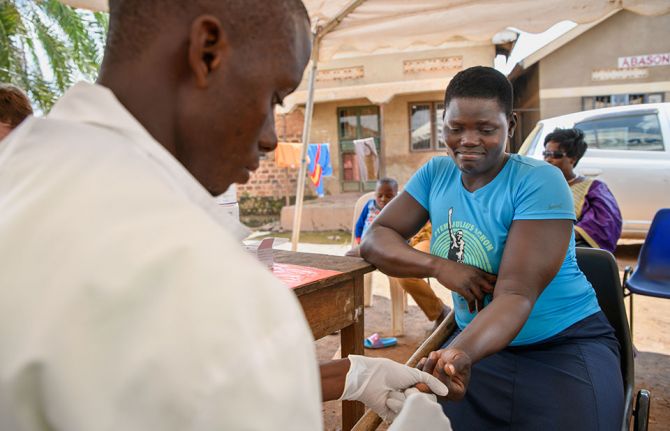
Feature Story
Positive Women with Disabilities in Uganda puts people at the centre during COVID-19 pandemic
29 March 2021
29 March 2021 29 March 2021The World Health Organization estimates that, globally, more than 1 billion people (15% of the world’s population) have a disability. Disability is increasing in prevalence due to ageing populations, trauma, accidents and chronic health conditions, including HIV, tuberculosis (TB) and COVID-19.
Persistent discrimination against and exclusion of people with disabilities, in particular women and girls with disabilities, increases their vulnerability, including their risk of HIV infection. People with disabilities, in particular women and girls with disabilities, also experience barriers to accessing HIV services and are left behind in HIV policy-planning, programme development, service delivery and data collection.
People with disabilities face stigma and discrimination in families and communities, lack transport to health-care facilities and are faced with poor attitudes of health workers while seeking health care.
Since 2004, the AIDS Service Organization (TASO), based in the Mulago Hospital Complex in Kampala, Uganda, has attempted to reach out to people with disabilities. However, it has had limited success due to the complexities of community-based care.
In 2016, in response to these challenges, Positive Women with Disabilities (POWODU) was formed out of TASO to pay special attention to people with disabilities living with HIV in order to reduce AIDS- and TB-related deaths, stigma and discrimination and to promote sexual and reproductive health and rights.
POWODU is headed by Betty Kwagala, a formidable advocate, trainer and woman living with HIV who has 25 years’ experience serving as a counsellor at TASO Mulago. Ms Kwagala is a respected and well-known figure in the community, who has uplifted the lives of many people living with HIV in Uganda.
POWODU, in partnership with TASO Mulago, reaches out to people with disabilities in the urban districts of Kampala, Wakiso and Mukono. According to TASO’s client register, there are more than 13 000 people with disabilities in Kampala and Wakiso enrolled into HIV care. Seventy per cent are women and the majority are homeless.
HIV testing and TB screening are integrated into every POWODU community outreach. “The services are always offered near to where people with disabilities reside because of mobility and transport challenges,” says Ms Kwagala.
If a client tests positive for HIV, POWODU offers immediate initiation of HIV treatment, as per the Ministry of Health guidelines. If a sputum TB test is positive, POWODU will refer the case to the main laboratory for further investigation and proper management. POWODU will then follow up, and, with the support of a TB focal person, arrange pick up for the client in a TASO van to escort him or her to receive the appropriate health service.
Other services offered on site by POWODU include sensitization on adherence to both HIV and TB treatment, prevention of HIV, TB and COVID-19 and accurate information on sexual and reproductive health and rights among people with disabilities.
“The COVID-19 pandemic has led to clients who have been lost to follow-up because they are homeless or reside in informal settlements. The lockdown caused more challenges, such as lack of food and a significant disruption to the usual activities that give them some income, such as begging,” says Ms Kwagala.
During the COVID-19 lockdown, UNAIDS supported 200 people with disabilities living with HIV with food rations, personal protective equipment and personal hygiene kits. It also supported a project to equip 40 people with disabilities with skills on how to identify income-generating activities. They were provided with popcorn-making machines and groundnut grinders.
TASO members were provided with megaphones and sensitized members of their communities on HIV, TB, COVID-19, sexual and reproductive health and gender-based violence.
“POWUDU and TASO have shown remarkable resilience by putting people at the centre during the COVID-19 pandemic by ensuring that people with disabilities living with HIV are safe and not left behind,” says Jotham Mubangizi, UNAIDS Country Director, a.i., for Uganda.
Our work
Region/country
Related

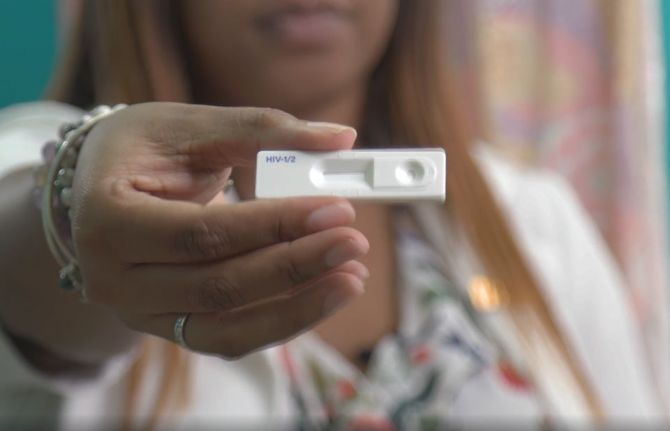
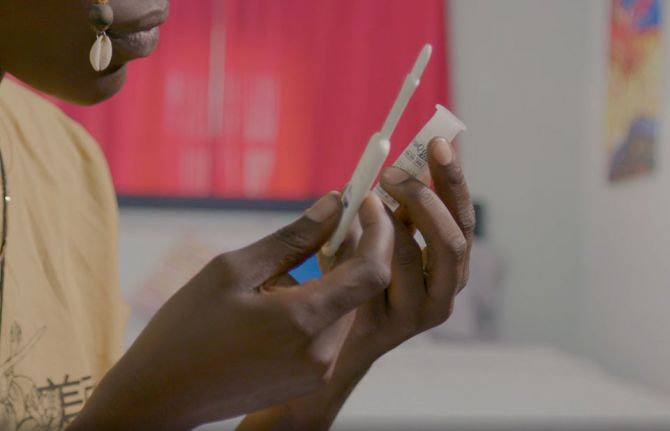

Feature Story
In Your Hands: Caribbean partners call for HIV self-testing during COVID-19
17 March 2021
17 March 2021 17 March 2021Stakeholders of the Caribbean HIV response have launched the In Your Hands HIV self-testing campaign, which advocates for self-testing policies to be developed and implemented as part of a comprehensive strategy to ensure that HIV diagnosis does not decline during the COVID-19 pandemic.
Even before COVID-19, the Caribbean was not on track to achieve the 90% testing target due at the end of 2020. In 2019, 77% of all people living with HIV in the Caribbean knew their HIV status. A survey conducted by the Pan Caribbean Partnership against HIV and AIDS (PANCAP) and the Pan American Health Organization (PAHO) showed that during 2020 facility- and community-based HIV testing services were reduced in 69% of countries due to COVID-19.
“This decline means that people with undiagnosed HIV are not getting life-saving antiretroviral treatment and, of course, continue to be unaware of their HIV status, with the risk of potentially exposing others,” said Sandra Jones, PAHO’s Technical Advisor for HIV/STI, TB & Viral Hepatitis in the Caribbean.
“The COVID-19 pandemic has presented the opportunity for us to explore new and innovative approaches that are result-oriented,” Rosmond Adams, the PANCAP Director, said.
According to James Guwani, the Director of the UNAIDS Caribbean Sub-Regional Office, it is particularly important to increase testing uptake among men, who are more likely to be diagnosed late. In 2019, 85% of Caribbean women living with HIV were aware of their HIV status, compared to just 72% of men. There is also a need to increase testing coverage among members of key populations, who have reduced access to HIV services due to stigma and discrimination.
The World Health Organization recommends that HIV self-testing be offered as an additional approach to facility- and community-based services. Evidence shows that self-testing is safe and accurate and increases testing uptake among people who may not test otherwise.
Through the campaign, partners are advocating for national policies to include a communication package with information to link testers to HIV prevention and treatment services, as well as minimum standards for the procurement and distribution of HIV self-testing kits in the private and public sectors.
“We strongly believe that HIV self-testing can help close the gap on the first 90. It can be targeted to individuals not being reached by existing HIV testing services, particularly those populations with low testing coverage and at high risk of HIV. It’s not a replacement for all testing services, but it should be included in the toolbox,” said Victoria Nibarger, the Caribbean Regional Programme Coordinator for the United States President’s Emergency Plan for AIDS Relief (PEPFAR).
Under a Global Fund to Fight AIDS, Tuberculosis and Malaria project for the region, work is under way to conduct a verification and feasibility assessment for the introduction of HIV self-testing across countries. Already Guyana has announced plans to roll out HIV self-testing this year, while several countries have either made a commitment to develop policies or are now in the process of doing so.
UNAIDS is helping to coordinate the campaign in the Caribbean, with a focus on supporting a knowledge management strategy that ensures all stakeholders have the information, messages and tools they need to successfully lobby at the national level. A key priority is ensuring civil society engagement and addressing community concerns about how self-testing policies will be implemented.
While representatives of communities of people living with HIV and key populations endorsed the call for HIV self-testing, they have advised that increased investments are needed in post-test counselling and adherence counselling for the entire HIV response.
Deneen Moore, a Caribbean representative of the International Community of Positive Women, said, “We need to improve peer navigation so that when people test positive they have someone there to help them. We also need more social contracting so that civil society organizations can help reach people who test positive. There is definitely a need for us to be involved in the process.”
The advocacy initiative is jointly endorsed by UNAIDS, PAHO, PANCAP, PEPFAR and the Caribbean Med Labs Foundation.




